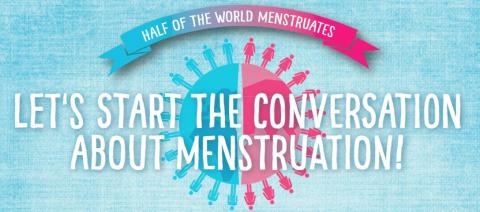
“Stigma around menstruation and menstrual hygiene is a violation of several human rights, most importantly of the right to human dignity”, Jyoti Sanghera, Chief of the UN Human Rights Office Economic and Social Issues Section, 2014
General context
Menstruation is a biological process that some people are born with. Half of the globe’s population experience having menstruation for more than 40 years of their lives. Yet, menstruation is surrounded by taboos and stereotypes across different cultures and countries. In 2014, the Berlin-based nonprofit WASH United started the global campaign Menstrual Hygiene Day establishing 28th of May as the reference day of the campaign. The aim was and still is to break the silence surrounding menstruation, which often leads to debilitating social stigma that negatively affects women, girls and transgender people across the globe.
How does menstruation link to Human Rights?
Health, education, women's rights, economics, sustainability are just some of the most pressing human rights issues that are linked to menstruation. For example, the lack of access to basic menstrual sanitation materials has a negative impact on the lives of young people who are bleeding; they feel forced not to attend school during menstruation. In this regard, the lack of adequate menstrual hygiene management denies people who are bleeding every month their right to education, right to health, and right to work in favorable conditions.
What does that exactly mean?
- The lack of inadequate water, sanitation and hygiene (WASH) at school determines some people to drop out school when they start to menstruate – right to education
- The lack of inadequate water, sanitation and hygiene impacts the health those bleeding every month negatively – right to health
- While the UN Basic Rules for the Treatment of Prisoners demand that men be able to shave, there is no provision to ensure that women can manage their menstruation adequately – right to be treated equally and non-discriminatory in accordance with your needs.
- Pain and discomfort are experienced by many of those that menstruate. How comfortable are our work places? Are they equipped with comfortable chairs, sofas or couches? How equipped are the bathrooms at your work place? – right to work in favorable conditions that correspond to your specific needs.
- Taboos and stereotypes surrounding menstruation lead to stigmatization of people who have this experience on daily basis. All human rights stem from the fundamental right to human dignity. When people who are bleeding every month are forced into seclusion, must use damp and soiled materials, are treated as second class citizen, dignity is difficult to maintain.
Respecting human rights should not be a beautiful combination of words on paper. It should be a reality that we all live in.
CEU context
The Menstrual Hygiene Day campaign at CEU is designed to address menstruation from a human rights perspective by bringing a different dimension of this subject to the CEU community’s attention every month. In this regard, we intend to organize a short campaign every month until May 28, 2016. We like to call these short campaigns teasers :)
The campaign “Menstruation friendly couches and sofas at CEU” launched on October 19, 2015 is the first one out of seven which will be organized through this year at CEU. The purpose of the first teaser was to raise awareness about the fact that menstruation can be painful and not very comfortable. People who are bleeding every month often do not talk about this experience due to several taboos and stereotypes surrounding menstruation. Therefore for many of us, menstruation is still an unknown process without being fully conscious how painful or difficult it can be. Having this reality, we asked ourselves how comfortable is the CEU campus? Where is it possible to rest on the CEU campus while coping with pain and discomfort?
Being treated equally and non-discriminatory is a human right. Equality does not only mean lack of discrimination, but also accommodation of the context in accordance with the needs of people. For example, there is a prayer room at CEU for people of different religions who are entitled to exercise their right to religion. Similarly, CEU puts consistent efforts in becoming an inclusive and accessible university for people with disabilities. Therefore we thought to become more aware of how comfortable the CEU space is for those bleeding every month and how we can use the existing space in a way that could ease one’s physical discomfort.
Moreover, a vast majority of us – CEU community- come from a privileged position/background where some of the issues that have been mentioned above (i.e. lack of proper hygiene, water, sanitation etc.) might not represent a difficulty that we have to deal with or have to face in our lives, but there are still many out there that continue to struggle with these issues and continue to have their basic human rights unfulfilled.
HRSI stands for creating an aware, concerned and engaged environment at CEU. How about you?
You can find more and various information about menstruation here:
Good Policy and Practice in Health Education: http://unesdoc.unesco.org/images/0022/002267/226792e.pdf
Every woman’s right to water, sanitation and hygiene: http://www.ohchr.org/EN/NewsEvents/Pages/Everywomansrighttowatersanitationandhygiene.aspx
Menstrual Hygiene Day: http://menstrualhygieneday.org/
5 ways to celebrate Menstrual Hygiene Day around the world: http://mashable.com/2015/05/28/menstrual-hygiene-day-celebrate/#7tldl9aLSsqc
Menstrual hygiene is fundamental to: http://menstrualhygieneday.org/wp-content/uploads/2014/04/MHDay_Factsheets_FINAL-.pdf